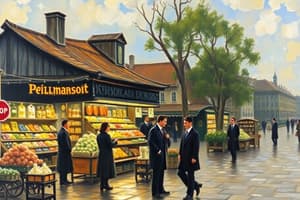Podcast
Questions and Answers
What is the primary focus of commerce?
What is the primary focus of commerce?
- Developing technological innovations
- Creating new employment opportunities
- Exchanging goods and services (correct)
- Enhancing government regulations
Which of the following is NOT a factor affecting commerce?
Which of the following is NOT a factor affecting commerce?
- Economic Conditions
- Technological Advancements
- Personal Preferences (correct)
- Government Policies
What does service commerce primarily involve?
What does service commerce primarily involve?
- Providing services such as banking and insurance (correct)
- Selling physical goods in retail stores
- Trading goods internationally
- Conducting online retail transactions
How does commerce enhance the standard of living?
How does commerce enhance the standard of living?
Which type of commerce involves selling goods in bulk to retailers?
Which type of commerce involves selling goods in bulk to retailers?
What is the primary focus of Supply Chain Management?
What is the primary focus of Supply Chain Management?
Which of the following is a primary objective of Marketing?
Which of the following is a primary objective of Marketing?
What does Logistics primarily concern itself with?
What does Logistics primarily concern itself with?
Which challenge in commerce involves adapting to changing market conditions?
Which challenge in commerce involves adapting to changing market conditions?
What is a significant concern related to Security Risks in commerce?
What is a significant concern related to Security Risks in commerce?
Flashcards
What is Commerce?
What is Commerce?
The buying, selling, and trading of goods and services for profit or mutual benefit.
What is Import-Export?
What is Import-Export?
The exchange of goods and services across international borders. It's influenced by taxes and trade agreements.
What is Retailing?
What is Retailing?
Businesses selling goods directly to consumers. This can be through department stores, supermarkets, or online shops.
How do Economic Conditions influence Commerce?
How do Economic Conditions influence Commerce?
Signup and view all the flashcards
How do Technological Advancements impact Commerce?
How do Technological Advancements impact Commerce?
Signup and view all the flashcards
Pricing Strategies
Pricing Strategies
Signup and view all the flashcards
Supply Chain Management
Supply Chain Management
Signup and view all the flashcards
Customer Relationship Management (CRM)
Customer Relationship Management (CRM)
Signup and view all the flashcards
Logistics
Logistics
Signup and view all the flashcards
Marketing
Marketing
Signup and view all the flashcards
Study Notes
Definition and Scope
- Commerce encompasses all activities related to the exchange of goods and services.
- It involves buying, selling, and trading of goods and services for profit or mutual benefit.
- Commerce broadly includes businesses, trade, and related activities.
- It relies on infrastructure like transportation, communication, and financial systems.
- The scope of commerce extends to various functions, including marketing, sales, distribution, and customer service.
Importance of Commerce
- Commerce facilitates economic growth by creating opportunities for trade and investment.
- It increases efficiency and productivity through specialization and division of labor.
- Commerce provides employment opportunities for people across various sectors.
- It connects producers and consumers, enabling the flow of goods and services throughout the economy.
- Commerce enhances the standard of living by providing access to a wider variety of goods and services.
- It promotes cultural exchange and understanding through trade relations.
Types of Commerce
- Retailing: Selling goods directly to consumers. Includes formats like department stores, supermarkets, and online stores.
- Wholesaling: Selling goods in bulk to retailers or other businesses. Involves distribution and logistics.
- Import-Export: Trading goods across international borders. Influenced by factors like tariffs, quotas, and trade agreements.
- Electronic Commerce (e-commerce): Buying and selling goods and services over the internet. Includes online retail, online auctions, and online banking.
- Service Commerce: The provision of services to customers, including banking, insurance, healthcare, and hospitality.
Factors Affecting Commerce
- Government Policies: Taxes, regulations, and trade agreements influence business operations and trade volume.
- Economic Conditions: Economic growth, inflation, and interest rates impact consumer spending and business investment.
- Technological Advancements: Innovations in technology improve efficiency, communication, and access to information within the commerce sector.
- Competition: The level of competition between businesses influences pricing strategies and market share.
- Consumer Preferences: Consumer tastes and demands drive demand for certain goods and services in the commerce sector.
- Infrastructure: Adequate transportation, communication, and financial systems are fundamental for smooth commerce operations.
Key Concepts in Commerce
- Supply Chain Management: The coordination of all activities involved in the flow of goods and services from supplier to customer.
- Marketing: The process of promoting and selling products or services to target customers.
- Logistics: Planning, implementing, and controlling the efficient flow of goods and services from origin to consumption.
- Pricing Strategies: Determining appropriate prices for products or services considering costs, competition, and consumer demand.
- Customer Relationship Management (CRM): Building and maintaining long-term relationships with customers.
Challenges in Commerce
- Competition: Businesses face intense competition from domestic and international players.
- Changing Consumer Preferences: Adapting to evolving consumer demands and preferences.
- Globalization: Navigating complex regulations and cultural differences in global markets.
- Economic Fluctuations: Managing the impact of economic downturns, recessions, and inflation.
- Security Risks: Protecting sensitive data and preventing cyberattacks.
- Ethical Considerations: Operating with integrity, adhering to ethical standards (fair labor practices and environmental responsibility) is vital.
Studying That Suits You
Use AI to generate personalized quizzes and flashcards to suit your learning preferences.




